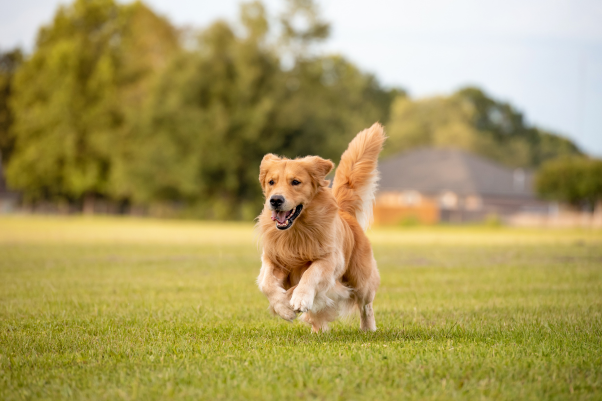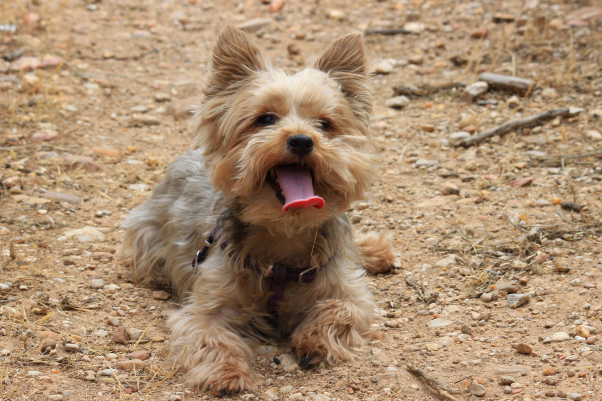
The Playful Charm of Dachshund Dogs: Unraveling the Secrets of this Adorable Breed
October 13, 2024
Welcome to 'The Golden Guide: Unleashing the Best Care Tips for Your Beloved Dog', where we'll explore the essential practices to keep your furry friend happy and healthy. Whether you're a first-time dog owner or a seasoned pro, this article will provide you with everything you need to know to give your dog the love and care they deserve.
In this comprehensive guide, we'll cover various aspects of dog care, from nutrition and exercise to grooming and training. Discover the perfect diet for your pooch, learn how to create a safe and stimulating environment, and uncover the secrets to effective communication with your canine companion.
Our team of experienced dog lovers and experts have distilled years of knowledge and research into this handy resource. We understand the unique bond between humans and dogs and the importance of providing them with the best care possible.
So, grab your four-legged friend, cozy up, and get ready to embark on a journey of discovery, as we unlock the golden tips and tricks for ensuring a long and happy life for your beloved dog.
The importance of proper care for your dog
Proper care is essential for the well-being and longevity of your canine companion. Dogs are loyal, loving, and intelligent creatures that rely on their human caretakers to provide them with the necessities for a happy and healthy life. By understanding the importance of comprehensive care, you can ensure that your furry friend thrives and enjoys a fulfilling existence by your side.
Caring for a dog is a long-term commitment that requires dedication, patience, and a deep understanding of your pet's unique needs. From meeting their basic requirements, such as nutrition and shelter, to addressing their emotional and physical well-being, each aspect of care plays a crucial role in your dog's overall quality of life. Neglecting any of these elements can lead to a range of health and behavioral issues, which can be distressing for both you and your beloved pet.
By investing time and effort into providing your dog with the best possible care, you not only enhance their life but also strengthen the bond you share. A well-cared-for dog is more likely to exhibit positive behaviors, form a stronger attachment to their human family, and live a longer, more vibrant life. Ultimately, the time and resources you dedicate to your dog's care will be rewarded with a loyal, loving, and healthy companion that will bring immense joy to your life.

Understanding your dog's needs and behaviors
To provide your dog with the best possible care, it's essential to develop a deep understanding of their unique needs and behaviors. Dogs are complex creatures with diverse physical, emotional, and social requirements, and recognizing these factors is key to ensuring their overall well-being.
One of the fundamental aspects of understanding your dog's needs is recognizing their breed-specific characteristics. Different dog breeds have varying tendencies, energy levels, and grooming requirements, all of which should be taken into account when developing a care routine. For example, a high-energy breed like a Border Collie will have different exercise needs compared to a more relaxed Bulldog. By tailoring your approach to your dog's breed, you can better meet their specific requirements and avoid potential issues.
In addition to breed-specific needs, it's crucial to observe and understand your individual dog's behavioral patterns, temperament, and preferences. Every dog is unique, and what works for one may not work for another. Pay close attention to your dog's body language, vocalizations, and reactions to different situations to gain insights into their personality and preferences. This knowledge will help you create a nurturing environment that caters to your dog's specific needs, whether it's providing extra socialization for a shy pup or offering calming activities for an anxious dog.
By taking the time to deeply understand your dog's needs and behaviors, you can establish a strong foundation for providing exceptional care and fostering a deep, lasting bond with your furry friend. This understanding will guide you in making informed decisions about their diet, exercise, training, and overall well-being, ensuring that your dog thrives and enjoys a fulfilling life by your side.

Creating a safe and comfortable environment for your dog
Providing your dog with a safe and comfortable environment is crucial for their physical and emotional well-being. A well-designed living space not only meets your pet's basic needs but also promotes their overall happiness and security. By creating a nurturing and stimulating environment, you can ensure that your dog feels at ease, content, and able to thrive.
One of the most important aspects of creating a safe and comfortable environment for your dog is establishing a designated living area. This should be a cozy, quiet space where your dog can rest, play, and feel secure. Consider factors such as size, lighting, and temperature to ensure that the area is suitable for your dog's needs. Provide comfortable bedding, familiar toys, and access to fresh water to make this space a true haven for your furry friend.
In addition to the living area, it's essential to dog-proof your entire home to prevent potential hazards. This includes securing loose wires, removing toxic plants, and storing cleaning products and medications out of reach. Carefully assess your living space and make the necessary adjustments to create a safe environment that minimizes the risk of accidents or ingestion of harmful substances.
Beyond the physical environment, it's crucial to foster a sense of emotional security for your dog. This can be achieved through positive reinforcement, consistent routines, and gentle interactions. Encourage your dog to explore their surroundings while providing a safe and nurturing presence, which will help them feel confident and at ease in their home. By creating a comfortable and secure environment, you can help your dog thrive and reduce the likelihood of behavioral issues or stress-related problems.

Providing a balanced diet and nutrition for your dog
Proper nutrition is the cornerstone of your dog's health and well-being. A balanced diet not only provides the essential nutrients your canine companion needs to grow and thrive but also plays a crucial role in maintaining their overall physical and mental state. By understanding the principles of canine nutrition and tailoring your dog's diet to their specific needs, you can ensure that they receive the nourishment they require to live a long, healthy, and happy life.
One of the primary considerations when it comes to your dog's diet is the quality of the food you provide. Opt for high-quality, nutrient-dense commercial dog foods or prepare homemade meals that meet your dog's nutritional requirements. Carefully read the labels and ingredients to ensure that the food is free from fillers, preservatives, and other potentially harmful additives. Consult with your veterinarian or a certified pet nutritionist to determine the appropriate caloric intake and macronutrient balance for your dog's age, breed, and activity level.
In addition to the quality of the food, it's important to pay attention to portion sizes and feeding schedules. Overfeeding can lead to obesity and associated health problems, while undereating can result in nutrient deficiencies. Establish a consistent feeding routine and monitor your dog's body condition to ensure they are maintaining a healthy weight. Remember, every dog is unique, and their dietary needs may vary, so be prepared to make adjustments as necessary.
Beyond the basics of a balanced diet, it's essential to consider any specific dietary requirements or restrictions your dog may have. Some dogs may have food allergies or sensitivities, while others may require specialized diets due to medical conditions. Work closely with your veterinarian to identify any dietary needs and develop a plan that meets your dog's unique nutritional requirements. By providing a tailored, high-quality diet, you can support your dog's overall health, energy levels, and immune function, ensuring they thrive in all aspects of their life.

Regular exercise and mental stimulation for a happy and healthy dog
Maintaining a healthy and happy dog goes beyond just providing a balanced diet and a comfortable living environment. Regular exercise and mental stimulation are equally crucial for your canine companion's well-being. By incorporating a variety of physical and cognitive activities into your dog's routine, you can help them stay physically fit, mentally engaged, and emotionally fulfilled.
Physical exercise is essential for dogs of all ages and breeds. It helps maintain a healthy weight, strengthens the cardiovascular system, and promotes overall physical fitness. The type and duration of exercise will depend on your dog's age, size, and energy level. For example, a high-energy breed like a Labrador Retriever may require more vigorous activities, such as long walks, runs, or playtime at the dog park, while a senior dog may benefit more from gentle, low-impact exercises like swimming or short, leisurely strolls.
In addition to physical exercise, mental stimulation is equally important for your dog's well-being. Dogs are intelligent creatures that thrive on learning and problem-solving. Providing them with activities that challenge their minds can help prevent boredom, reduce destructive behaviors, and keep them mentally sharp. Consider incorporating training sessions, interactive toys, and puzzle feeders into your dog's routine to engage their cognitive abilities and satisfy their natural curiosity.
By combining physical and mental stimulation, you can create a well-rounded exercise regimen that caters to your dog's unique needs and preferences. This holistic approach not only promotes physical health but also helps to reduce stress, anxiety, and behavioral issues. Regular exercise and mental stimulation can also strengthen the bond between you and your furry friend, as you work together to explore new activities and challenges.
Remember, the key to a happy and healthy dog is finding the right balance of physical and mental exercise that suits your pet's individual needs. Consult with your veterinarian or a professional dog trainer to develop an exercise plan that will keep your dog in top condition and provide them with the enrichment they crave.

Grooming and hygiene tips for your dog
Maintaining your dog's grooming and hygiene is an essential aspect of their overall care. Regular grooming not only keeps your furry friend looking their best but also plays a crucial role in their physical and emotional well-being. By establishing a consistent grooming routine, you can ensure that your dog stays clean, comfortable, and healthy throughout their life.
One of the fundamental grooming tasks is regular bathing. Depending on your dog's breed, activity level, and environmental factors, they may require bathing anywhere from once a month to once every few months. Use a gentle, high-quality dog shampoo and lukewarm water to cleanse your pet's coat, taking care to avoid getting water in their ears or eyes. Thoroughly dry your dog after the bath to prevent skin irritation or infection.
In addition to bathing, brushing your dog's coat is a crucial part of their grooming regimen. Brushing helps to remove loose hair, distribute natural oils, and prevent matting and tangles. The frequency of brushing will depend on your dog's coat type, with longer-haired breeds generally requiring more frequent attention. Invest in high-quality brushes and combs that are suitable for your dog's specific coat, and be gentle to avoid causing discomfort.
Proper nail care is another essential aspect of your dog's grooming routine. Overgrown nails can cause discomfort, lead to joint issues, and even make it difficult for your dog to walk. Regularly trim your dog's nails, either by using specialized nail clippers or by taking them to a professional groomer. Be cautious when trimming, as cutting the quick (the blood vessel inside the nail) can be painful and cause bleeding.
Maintaining your dog's dental health is also crucial for their overall well-being. Plaque and tartar buildup can lead to gum disease, tooth decay, and other serious health problems. Brush your dog's teeth regularly using a soft-bristled toothbrush and dog-safe toothpaste. Additionally, provide dental chews or toys to help keep their teeth and gums healthy.
By incorporating these grooming and hygiene practices into your dog's routine, you can help ensure their comfort, prevent potential health issues, and strengthen the bond between you and your furry friend. Remember to tailor your approach to your dog's individual needs and consult with your veterinarian or a professional groomer for guidance on the best grooming methods for your pet.

Training and socialization for a well-behaved dog
Training and socialization are essential components of responsible dog ownership, as they not only help to shape your canine companion's behavior but also contribute to their overall well-being and the harmony of your household. By investing time and effort into these crucial aspects of your dog's development, you can cultivate a well-behaved, confident, and well-adjusted pet that is a joy to have around.
Training your dog is a multifaceted endeavor that encompasses a range of skills, from basic obedience commands to more advanced tricks and behaviors. Consistent, positive-reinforcement training not only teaches your dog to respond to your commands but also helps to establish a strong bond of trust and communication between you and your furry friend. Whether you opt for group training classes or one-on-one sessions with a professional dog trainer, the key is to be patient, persistent, and reward-focused in your approach.
Alongside training, socialization is equally important for your dog's development. Exposing your canine companion to a variety of people, animals, and environments in a controlled and positive manner helps them to become well-adjusted, confident, and less likely to exhibit fear-based or aggressive behaviors. Start the socialization process early, and continue to provide your dog with opportunities to interact with new stimuli throughout their lifetime. This can include visits to the dog park, playdates with other canine friends, and introductions to new people and situations in a safe and supervised manner.
By combining training and socialization, you can create a well-rounded, well-behaved dog that is a pleasure to have in your life. A well-trained, socialized dog is less likely to engage in destructive or problematic behaviors, making them a welcome addition to your family and community. Moreover, the process of training and socializing your dog can be immensely rewarding, as you witness your furry friend grow and develop into a confident, responsive, and well-adjusted companion.
Remember, training and socialization are ongoing processes that require patience, consistency, and a deep understanding of your dog's individual needs and temperament. Consult with a professional dog trainer or behaviorist if you encounter any challenges or need additional guidance in shaping your dog's behavior and social skills.

Preventive healthcare for your dog - vaccinations, flea and tick control, etc.
Maintaining your dog's health is a multifaceted endeavor, and preventive healthcare plays a crucial role in ensuring their long-term well-being. By proactively addressing potential health issues and implementing preventive measures, you can help your canine companion avoid serious illnesses, reduce the risk of disease transmission, and enjoy a healthy, happy life by your side.
One of the most important aspects of preventive healthcare for your dog is maintaining a comprehensive vaccination schedule. Vaccines protect your pet against a range of infectious diseases, such as parvovirus, distemper, and rabies, which can be life-threatening if left untreated. Work closely with your veterinarian to develop a vaccination plan that is tailored to your dog's age, breed, and lifestyle, and ensure that they receive their shots on time to maintain optimal protection.
In addition to vaccinations, regular parasite prevention is essential for your dog's health. Fleas, ticks, and other parasites can cause a range of problems, from skin irritation and anemia to the transmission of dangerous diseases. Utilize effective flea and tick control products, such as topical treatments or oral medications, to keep these pests at bay and safeguard your dog's well-being. Be sure to consult with your veterinarian to choose the most appropriate products for your pet.
Regular check-ups with your veterinarian are also a crucial component of preventive healthcare. These routine visits allow your vet to monitor your dog's overall health, identify any potential issues early on, and provide guidance on maintaining their well-being. During these appointments, your veterinarian may recommend additional preventive measures, such as heartworm testing and prevention, dental cleanings, or screening for common health problems based on your dog's age, breed, and individual needs.
By staying proactive with your dog's preventive healthcare, you can help them avoid serious health issues, reduce the risk of costly medical treatments, and ensure that they enjoy a long, happy, and healthy life. Remember, prevention is key when it comes to your canine companion's well-being, so work closely with your veterinarian to develop a comprehensive healthcare plan that meets your dog's unique requirements.

Recognizing and addressing common health issues in dogs
As responsible dog owners, it's crucial to be vigilant in recognizing and addressing any potential health issues that may arise in our canine companions. While dogs are generally resilient creatures, they can be susceptible to a variety of common health problems, ranging from minor ailments to more serious conditions. By being proactive and understanding the signs and symptoms of these issues, we can take prompt action to ensure our furry friends receive the necessary care and treatment they deserve.
One of the most prevalent health concerns in dogs is obesity, which can lead to a host of other problems, such as joint pain, diabetes, and heart disease. Keeping a close eye on your dog's weight, body condition, and eating habits can help you identify and address any issues before they become more severe. Consult with your veterinarian to develop a balanced diet and exercise plan to maintain your dog's optimal weight and overall health.
Skin and coat problems, such as allergies, hot spots, and parasitic infestations, are also common in dogs. Pay attention to your pet's skin, coat, and overall grooming needs, and be vigilant for any signs of irritation, redness, or excessive scratching. Prompt treatment, often in the form of medicated shampoos, topical ointments, or anti-inflammatory medications, can help alleviate these issues and prevent them from becoming more serious.
Digestive issues, including vomiting, diarrhea, and loss of appetite, can also be a cause for concern. While these problems may sometimes be minor and resolve on their own, persistent or severe cases may indicate an underlying health condition that requires veterinary attention. Be mindful of any changes in your dog's bowel movements or feeding habits, and consult with your vet if you notice any concerning symptoms.
In addition to these common health issues, it's important to be aware of the potential for more serious conditions, such as cancer, heart disease, and neurological disorders. Regular check-ups with your veterinarian, as well as prompt attention to any unusual symptoms or changes in your dog's behavior, can help ensure that these problems are detected and addressed as early as possible, maximizing the chances of successful treatment and a positive outcome.
By staying informed and proactive about your dog's health, you can play a vital role in ensuring their well-being and longevity.




